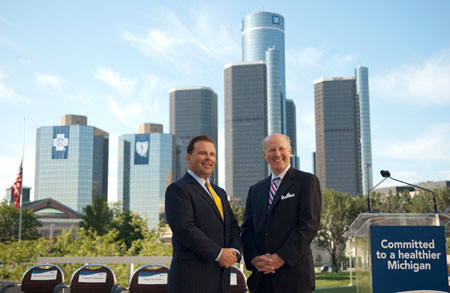
While Detroit’s automotive industry has fueled Detroit’s economic growth these past 75 years, health care and life sciences may well be the future engine of our state’s economy.
According to reports issued by the Detroit Regional Chamber of Commerce at its Detroit Regional Chamber Mackinac Policy Conference earlier this year, Michigan’s health care and life science industries are among the nation’s top rated and hold potential for seismic job growth and creation opportunities. They bring in millions of dollars of research and development investment and are attracting a highly-skilled, high-paid talent pool of workers and patients from across the country and around the globe.
One company, Blue Cross Blue Shield of Michigan (BCBSM), has been leading the way through insightful investments in efforts anticipated to spur economic growth. With 7,000 or more employees and nearly 4.5 million members statewide, BCBSM is in a unique position to mobilize change.
The Blues’ widely-applauded decision to move 3,000 of its employees from offices located in Southfield to the Detroit Renaissance Center, beginning in 2011, will increase its downtown Detroit workforce to about 6,000 people, save more than $30 million in long-term real estate costs and boost BCBSM to one of the largest employers in the city of Detroit.
The company is credited with returning more than $19.8 billion in premiums back into our state’s economy through payments made to Michigan-based health, dental and vision care providers, in addition to spending more than $311 million with Michigan-based suppliers this past year.
BCBSM is also leading national efforts to improve health care by introducing its Patient-Centered Medical Home (PCHM) program, the largest program of its kind in the nation. The PCMH model is helping restore a more personal level of patient engagement, providing primary care physicians the opportunity to lead a patient’s professional care from diet and nutrition counseling to testing and monitoring health conditions.
For patients, the PCMH model creates a single point of contact for care. Many express relief, having one practitioner overseeing their healthcare needs. The approach is expected to reduce health care costs dramatically by promoting wellness, reducing unnecessary and costly visits to the emergency room and shortening hospital stays.
Since 2004, Blue Cross has invested more than $3.4 million to reduce childhood obesity in Michigan through various programs designed to keep kids active and fit and to encourage healthier eating habits at home and in schools.
Currently, experts estimate obesity increases Michigan’s healthcare costs by more than $3 million annually. With approximately 30 percent of Michigan adults now considered obese and another 35 percent considered overweight, the issue is expected to continue among our top national healthcare concerns this next decade.
BCBSM is also focused on improving health care quality by transforming health care protocol, delivering significant savings and improving patient outcomes. For example, a 2009 study of the safety of heart CTs, published in the prestigious Journal of the American Medical Association, is now being used nationally by hospital and imaging facilities.
Handwritten prescriptions are also becoming a thing of the past thanks to BCBSM, which ranks third in prescribing drugs electronically.
Making health care simpler, more accessible and affordable is only a part of BCBSM’s prescription for growth. It’s a good effort worthy of our support.